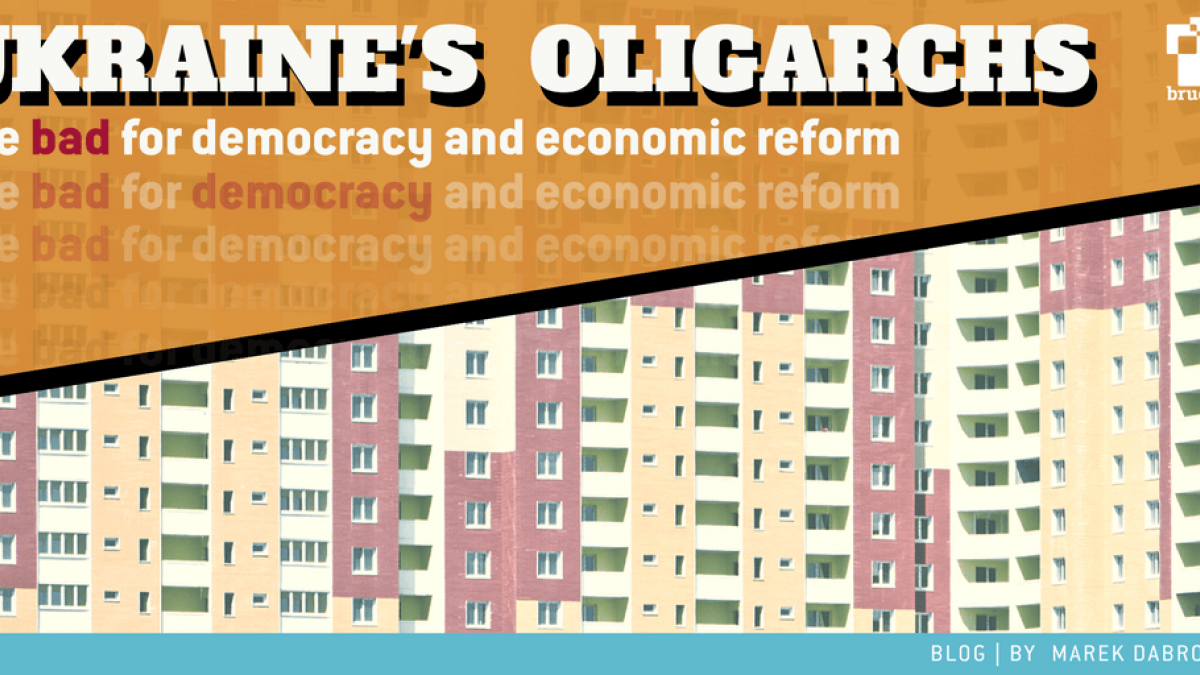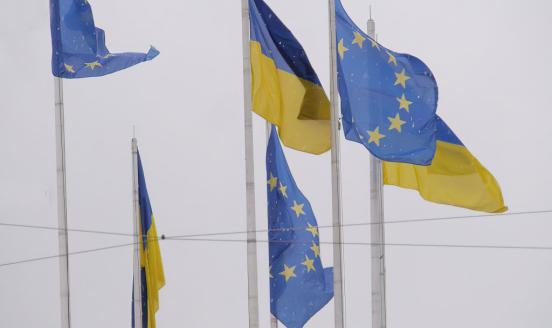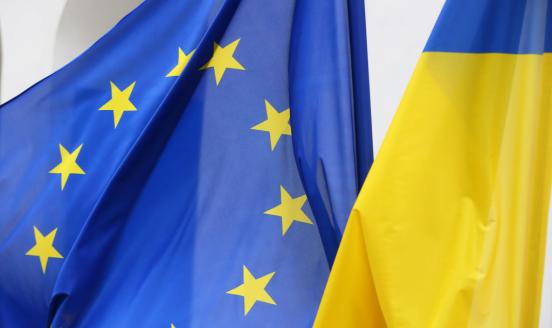Ukraine’s oligarchs are bad for democracy and economic reform
Ukraine’s late and incomplete economic reform created a class of super-wealthy oligarchs who now stand in the way of further liberalisation. The oliga

The slow-reform trap
Ukraine’s reform record has long been disappointing on both the economic and political fronts. While Ukraine avoided falling into full authoritarianism, like many of its post-Soviet neighbours, it nonetheless failed to build a transparent and stable democratic order. Thus, through most of its history as an independent nation Ukraine has been ranked as ‘partly free’ by Freedom House. Economic reforms started late and were never comprehensive or decisive enough to produce rapid and sustainable growth, robust to macroeconomic turbulence. As a result, between 1992 and 2016, Ukraine’s GDP per capita in purchasing power parity terms increased by only 35%, a much weaker increase than in other post-communist countries.
For more on 'intermediate winners' see:
Hellman, J. (1998) ‘Winners Take All: the Politics of Partial Reform’, World Politics Vol. 50, pp. 203-234
Krueger, A.O. (1993) Political Economy of Policy Reform in Developing Countries (The Ohlin Lectures), The MIT Press
Late and incomplete reforms created numerous market distortions and sources of administrative rents tapped by those who were close to power. This was the primary source of many business empires (owned by the so-called oligarchs), starting from the late Gorbachev era. And those ‘intermediate winners’ (Krueger, 1993; Hellman, 1998) who benefited from an economic system that was neither fully reformed nor fully transparent effectively opposed further changes. They especially fought against reforms which could undermine their monopolistic positions and eliminate sources of rents.
Oligarchs and their political influence
In this context, Ukraine’s political and economic system is rightly characterised as an oligarchic one. On the one hand, businesspeople have held prominent political roles, such as president, prime minister, cabinet members, members of parliament (MPs) or regional governors. On the other hand, those who have held political power have often used it for either building or expanding their own businesses. This was best illustrated by the kleptocratic Yanukovych regime in 2010-2013.
This oligarchic system creates a deep social distrust towards the government, and undermines the legitimacy of the entire Ukrainian political system. Even when politicians take the right decisions they are suspected of doing so for their own material benefit.
Unfortunately, since 2014 there has not been much change. Businesspeople continue to hold leading political roles (like president Petro Poroshenko). Immediately after the Euromaidan protests, the political influence of some oligarchs increased even further thanks to their role in stabilising the domestic political situation and fighting external aggression. Examples included Ihor Kolomoysky and Serhiy Taruta, who were nominated as governors of the Dnipropetrovsk and Donetsk regions respectively. Kolomoysky played the leading role in organising and financing battalions of volunteers to defend the Donbas region. However, as the major shareholder of Privatbank (the largest commercial bank in Ukraine), International Ukrainian Airlines and Ukrnafta he actively resisted reforms in those sectors.
Parliament under oligarchic control
Ukraine, similarly to other post-communist countries, has not formed a stable system of political parties. After the Euromaidan, most previous parties disappeared from the political scene (except the Fatherland - Batkivschina - party of Yulia Timoshenko), and were replaced by new ones. However, these also look fragile and might not survive the election cycle of 2018-19.
Most current political parties were either formed or are supported by powerful business groups and remain at least partly dependent on them. This is also the case for individual MPs who are financially supported by business ‘sponsors’, or even paid for endorsing or rejecting legislation. The legislative process is thus extremely corrupt and an easy target for capture by powerful lobby groups. To make things more complicated, the largest parties are penetrated by several business groups, often with conflicting aims.
Ukraine’s mixed electoral system in which half of the seats in parliament are distributed via a proportional representation system and half of MPs are elected in single-seat constituencies based on first-past-the-post voting, further weakens political parties, helps oligarchs and other interest groups to elect their representatives, and encourages political corruption. Because of the weakness of Ukraine’s political parties, MPs from single-seat constituencies often owe greater allegiance to those who finance their campaigns than to their parties. Overall, in such circumstances, the cabinet of ministers, even if represents formally the parliamentary majority, cannot count on party discipline in parliamentary voting.
Although the law on state financing of political parties was adopted in 2015 (Kosmehl and Umland, 2016) it should be supplemented by other legislation on, for example, the conduct of the mass media (largely owned by oligarchs) during election campaigns to have a positive impact on fighting political corruption. In addition, the already existing rules on financing political parties from private sources should be effectively enforced.
Overall, one may hope that if reforms aimed at creating an open and competitive economic and political system progress enough, they will undermine the monopolistic positions of the largest business groups and, thus, the sources of their political rents and influence.
How to fight corruption?
Fighting corruption has become one of the key demands of both the Ukrainian public and external donors. Several institutional and policy steps have been taken in this direction, purpose such as creating the National Anti-Corruption Bureau of Ukraine (NABU) and the Specialised Anti-Corruption Prosecutor’s Office (SAPO), staffing both through open and merit-based recruitment processes. E-declarations of assets for public officials and an electronic public procurement system have also been introduced. Unfortunately, other law-enforcement agencies such as the General Prosecutor’s Office, the Security Service of Ukraine (Sluzhba Bezpeki Ukrainy – SBU) and various police formations have been reformed less or not at all. The judicial reform remains in its initial phase and has long way to go.
The main question concerns the balance between policies aimed at the elimination of the sources of corruption and fighting the symptoms of corruption. While some important steps have been taken towards eliminating systemic sources of corruption (such as stopping natural gas subsidies, the new electronic public procurement system, budget financing of political parties, strengthening banking supervision and revoking banking licenses in cases of fraudulent banking practices) many others wait for implementation. These include introducing an open and transparent privatisation process, establishing a private land market, further reform of the energy sector, elimination of tax exemptions and foreign exchange restrictions, reform of the public administration, law enforcement agencies and judiciary, simplifying business regulations, enforcing rules on the private financing of political parties, reform of the electoral law, including the role of the private media in election campaigns, and many others.
Uncertain prospects for reform
Compared to previous attempts, especially that following the Orange Revolution in 2004, the current round of reforms has proved more successful (Dabrowski, 2017). But reforms remain unfinished in many important areas and chances for their completion soon look uncertain. The window of political opportunity created by regime change and the mobilisation against external aggression in 2014-15 seems to be closing. Ukraine is now approaching a new electoral cycle in 2018-19, where the largest business groups will surely try once again to capture political control over the Ukrainian state.



